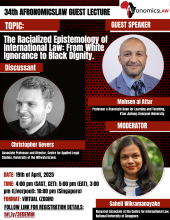Call for Papers - Digital Solidarity and International Law: Collective Action and Human Rights in the Digital Age
“Digital Solidarity and International Law: Collective Action and Human Rights in the Digital Age” is an edited volume to be published under a contract with Routledge in the Routledge Research in International Law series. It will examine how solidarities are formed and expressed in the digital sphere and their implications for international law in areas including human rights, trade, environment, health, and peace and security. The volume is edited by Dr Yohannes Eneyew Ayalew (The Hebrew University of Jerusalem), Dr Karin M Frodé (Monash University), and Dr Christopher Nyinevi (ECOWAS Court of Justice).
